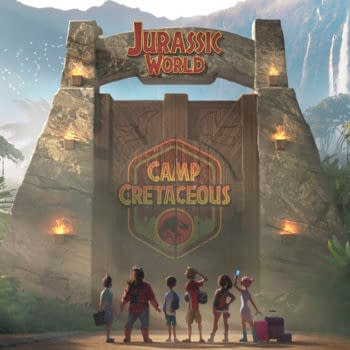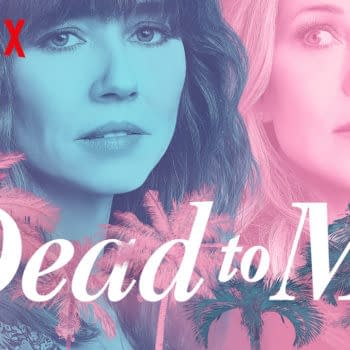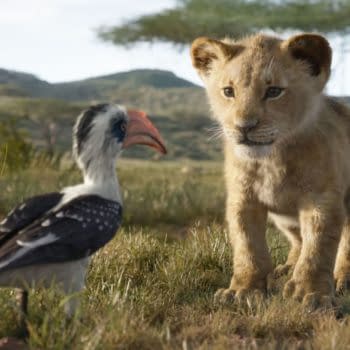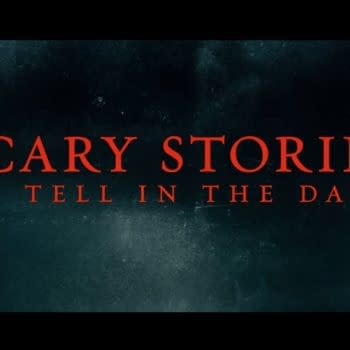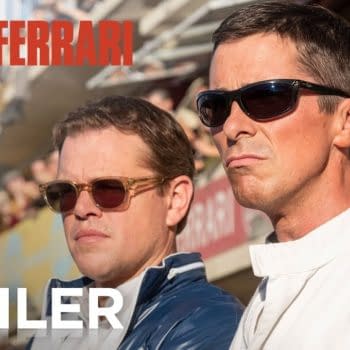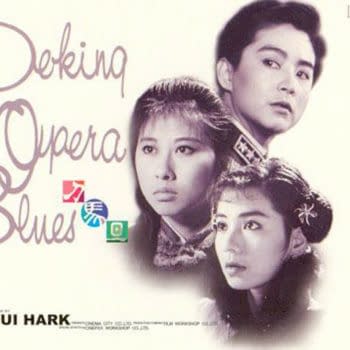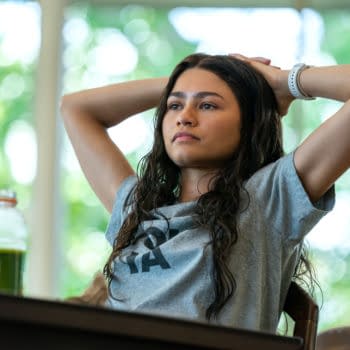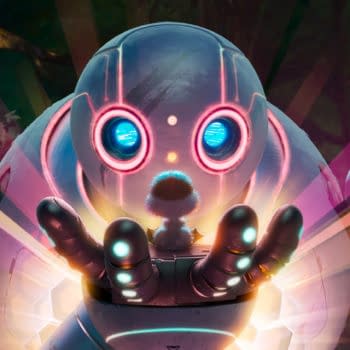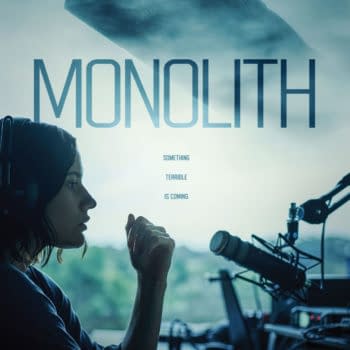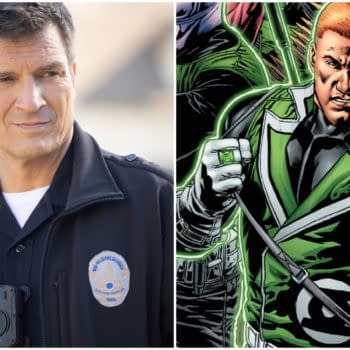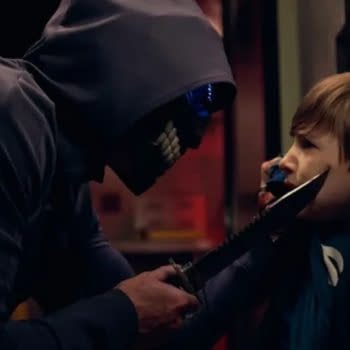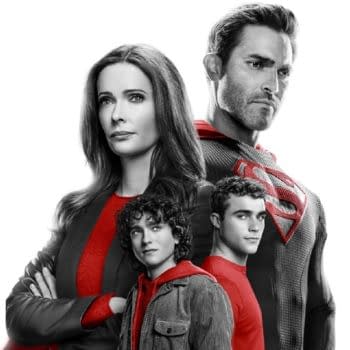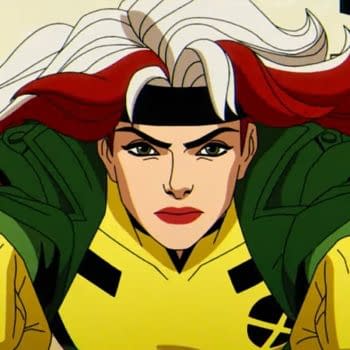Posted in: Movies, Recent Updates, TV | Tagged: battlestar galactica, interview, Outlander, philip k dick, Ron D. Moore, Ron Moore, ronald d. moore, star trek, starz
Ron D. Moore On Why Replicators are the WORST, and Other Words of Wisdom
Earlier this year, I was lucky enough to sit down for a one on one interview with Ron D. Moore. You may recognize that name from his Star Trek days, or perhaps his reimagining of Battlestar Galactica, maybe STARZ's hit series Outlander, or even the upcoming Philip K. Dick anthology series for Amazon.
No stranger to conventions, interviews, and fans, Ron was kind enough to bargain a bit of his time for a premiere parking spot — because that's important sometimes. Also, maybe it was the novelty of having one of the shortest raptor pilots in a flight suit interview him; who knows.

Our chat happened right after a panel that Ron was on, where inevitably Star Trek came up, and somehow the topic of replicators was reached. Hence, the first question.
Bleeding Cool: Hi, Ron.
Ron Moore: Hi.
BC: So, that panel you were just on — you talked about the Star Trek writers room, and specifically, how you hate replicators.
Ron: Yes. Replicators are the worst thing ever. Destroys storytelling all the time. They mean there's no value to anything. Nothing has value in the universe if you can just replicate everything, so all that goes away. Nothing is unique; if you break something, you can just make another one. If something breaks on the ship, it's "Oh, no big deal, Jeordie can just go down to engineering and make another doozywhatsit." Or they go to a planet and that planet needed something: "Oh, hey, let's make them what they need!" [The writers room] just hated it and tried to forget about it as much as possible.
BC: I've been fortunate enough to be in a few pressrooms with you now, most notably the first Outlander pressroom at SDCC. It was really neat to hear you talk about the project, which is obviously something you have a lot of passion for. And yeah, I know you've told the story about how you came to the series, that Terry (Terry Dresbach, the costume designer for Outlander, as well as Ron's wife) introduced you to the books.
Ron: Yeah, Terry had been a fan of the books for many years, and Maril [Maril Davis, Ron's longtime producing partner] knew the books. And they'd never really talked about it, but as Galactica and Caprica were winding down, the three of us had dinner and started talking about what's next; what the dream project would be. One of them mentioned Outlander, and the other one went, "Oh my god, you love that too?!" They told me, "Oh, you'll really like them. They're historical fiction, strong female character," and I said OK.
I got the first book and read it, and thought, yeah, OK, I can see this as a TV series. It's interesting, because my first read of it was as a piece of material, not as a fan. I've never really had that experience of reading books for pleasure, instead of giving yourself over to this as work. It's always an analytical process; I can get caught up in being interested and surprised, but it's such a different experience from just picking up a book and kind of losing yourself.
BC: We know that your next project, is based on another notable literary work, namely some of Philip K. Dick's anthology work. That's pretty exciting, considering how well your previous book-to-show adaptation has gone.
Ron: It is pretty exciting, it's a cool interesting project. It's myself, Bryan Cranston, and Michael Dinner, Isa Dick Hackett, who is Philip's daughter. We're all sort of banding together for this project. It's an anthology series and it'll be on Amazon in the United States, 10 episodes for the first season. We're shooting five of them in Chicago and five of them in London.
There's no formal writing staff; we farmed out each episode to writers and directors that we knew who might be interested in the material. Each writer looked at a different short story and decided how big of an adaptation to do. I wrote one of the episodes, and mine is very far from the literal version of the short story. But it still has the spirit and the idea that was embedded in the short. Others hue a little bit closer to the source, story, and characters on the page. It's been a really fun process because every one, every one of these pieces is so different.
BC: And on the topic of that little SyFy show, that Battlestar thing. (Ron smiles and guffaws a bit, humoring me.) It's been 10 years. Have you gone back and watched the show at all since then?
Ron: I have not rewatched the whole series, but I've watched pieces of it with my son. He watched it for the first time a couple of years ago, and so I watched the first night's miniseries, and "33", and I watched the finale with him. But I haven't watched the vast majority since the broadcast, no.
BC: Are you gonna at some point, or are you one of those folks who cannot watch their projects after the fact?
Ron: It's not a matter of not wanting to, it's a matter of if I had the time. I think I'd enjoy doing it; I'm far enough away from it now that I think I can watch them as episodes. At the beginning, you're so close to it, having produced them, and there's that part of your brain which is constantly remembering the earlier drafts of the story, the scenes that got cut, the things you feel you didn't get right, the flaws…just the cumulative process that's always present when you're watching it. If you step back a few years, that does sort of go away, and you can just watch it, just as a piece of television.
I've found that when I've gone back and watched old Star Trek episodes for the Blu-rays they put out when I went in to do the commentary. It was for Next Generation, and it was funny to go back and watch it and sort of ask myself for some of them, "Did I write this?" I think I'm at a place where it would be fun to watch Battlestar.
BC: You do these Q 'n' A's on Twitter occasionally, and the other day, you were talking about Carnivale, and I kind of got the sense by what you and the fans said that you had a tremendous amount of pride for the series, and wish it was better received.
Ron: I think that was a very ambitious show. I only worked on the first season, I ran the first season, but left after that to do Galactica. I am proud of it, it was completely underrated at the time, it was such an interesting project. But in all honestly, I know that internally, we didn't know what the hell we were doing with it. We had no idea what "this" meant, and the creator of the show Daniel Knauf was on the writing staff with us, and he'd be the first to tell you he didn't know either.
(Author's note: The AV Club ran this interview with Knauf in 2013, pretty great background on Carnivale and what his end plan was for the doomed series.)
We were sort of making it up, and remaking it up, and reinventing all through that first season. It was frustrating, it was a very difficult show to produce, and politically in the show and with the network it was problematic in a lot of ways. It was the show I wanted to quit all the time, but then I would watch the dailies, and I would be so moved and impressed that I would think, "Wow, look at what we've created, I've never seen anything like this on TV," with the amazing cast, and it was visually stunning with the world, with the magical realism happening. I do wish it had a bit more oomph in terms of what people thought about it, and how it was received though.
BC: I think that if it was on right now, it would be getting all the love and accolades of something like a Westworld. I mean the Freak Show season of American Horror Story borrowed heavily from Carnivale.
Ron: Yeah, it was way ahead of its time. It was tapping into something that wasn't really out there in the TV landscape.
BC: You've worked now with several different networks, and you seem to get along pretty well with the folks at STARZ. What has that been like, working with them as a network?
Ron: Oh they're great. In all honesty, they're the best network I've worked with. They're very open creatively. You can argue with them, and argue them out of things, which is a rare thing, because typically network execs get very dug in. But with STARZ you can have debates about things, and their point of view is valid, and I get what they're after. Sometimes they'll even say, "Well, if you really believe in it, go for it." I don't really ask much more than that from a network, and they're very supportive of the show.





